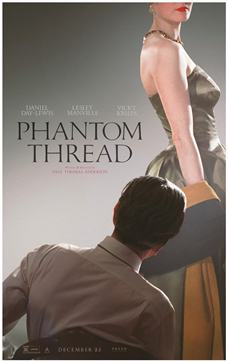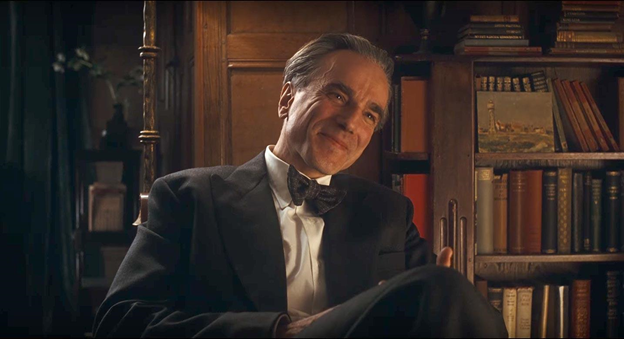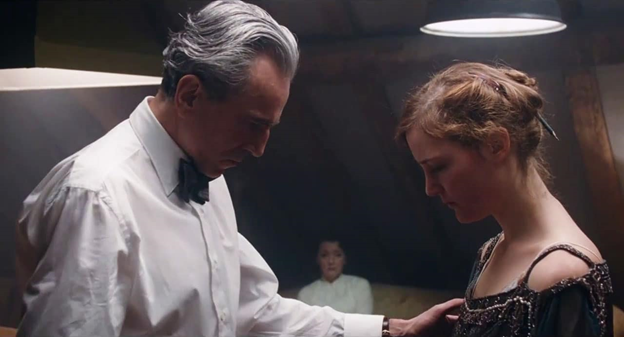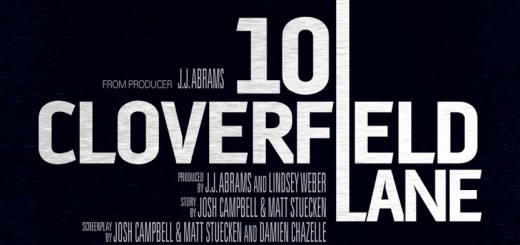PHANTOM THREAD Review

Director: Paul Thomas Anderson
Genre: Drama
Year: 2017
Say what you will about each particular Paul Thomas Anderson release, the one truth that cannot be denied is his quest for perfection. There’s something highly commendable about an artist who’s willing to take two-to-three years between projects, tuning them to be the best of their ability. It’s a quality that separates the likes of Anderson from say, Spielberg; a filmmaker who is fantastic in equal measure, but has recently been on a yearly roll of film releases, a workmanlike attitude that has no doubt hampered the quality of the screenwriting in his later years.
That is to say, surely Anderson needs that extra year (after all, he writes his own scripts), but he isn’t in a rush to release anything. It’s an authorial pacing that manifests itself in the linings of his latest cinematic outing, PHANTOM THREAD, a slow, reverent study of love and its ability to change the most clouded minds. Not only an outstanding contribution to Anderson’s canon, but a ravishing reversal of countless themes established in the director’s prior works: both a study of pretense at large and the thresholds of self-indulgent and affectionate hedonism.

Pictured: Hedonism
Daniel Day-Lewis, back in Anderson’s arms, plays a structural antithesis to THERE WILL BE BLOOD’s Daniel Plainview. Where his monolithic 2007 dissertation on American capitalism studied a man’s growing desertion of love and family due to his insatiable greed, PHANTOM THREAD does somewhat of the opposite. It is a story of an egomaniac callously consumed by his art, disengaged from his loved ones and disinterested in their gratification. It is a costume drama incinerated in its own artifice, its characters engaged in acts of selfishness within communities that value facades over earnestness: a period piece that disbands it’s sincerities from all of its visual synthetics.
Over the course of 130 minutes, Anderson shifts this man’s allegiances with the introduction of Alma (played by Vicky Krieps), a young bachelorette whom he takes under his wing as his new muse. What follows is a sadomasochistic game of infatuation and control, a selfish man learning that his free-spirited object of desire refuses to remain in his gilded cage, all whilst his sister (played by the astonishing Leslie Manville) inserts herself into this narrative as well. It is a study of our commitments, and how far we will leave our comfort zones—even when they are rigorously implanted into our professional routine—for true love, all delivered by three of the finest performances of 2017, effortlessly cascading from passion to neglect.

At 3:15 we do the polka in Silver Lake and at 4:00 we need to be at Union Station to eat frijoles, now put on this dress or get out
All of that is to say, PHANTOM THREAD will rank among Anderson’s most unorthodox cinematic outings. Despite its razor-sharp rhetoric, it’s rather optimistic. No trace of THE MASTER’s narrative scope is left, and the externalized conflicts of INHERENT VICE are nowhere to be found either. It is, in most regards, much akin to PUNCH DRUNK LOVE, a film that, despite its far more aloof sensibilities, shares a certain offbeat comic candor with Anderson’s latest. If a Kubrick comparison must be drawn—as seems par for the course with mainstream auteurs—this is Anderson’s EYES WIDE SHUT.
Having said all that, I do sometimes wonder if PHANTOM THREAD is missing an extra kick in the gut. It doesn’t boast the dramatic chutzpah of the average Anderson release, and its off-kilter, slow burn melancholia keeps the film at a simmer, never reaching a boil. Perhaps there is something to be said in favor of this mechanic; Anderson seems to hold his cards back, opting out of an increase in narrative stakes so as to support the character drama front and center. But the most curious aspect of PHANTOM THREAD is ultimately how conveniently topical it has become in 2017, a year mired in the scandals of abuse within creative fields. Though certainly not targeted at these particular events, Anderson highlights the fact that Day-Lewis and himself are well aware of the obsessive, dangerous control egocentric creatives have in their respective industries.
It’s a peculiar film for a director with such a ostentatious catalogue, distinctly old school in an era of filmmaking that seems to be pushing sociopolitical boundaries. But there is nothing to be said against it. It is a deeply internal, deceptively intimate picture from a director who has made his name through 21st century epics. It’s both a personal ode to filmmaking from Anderson himself, and a solemn farewell from Day-Lewis as an actor, a study of the toll that one’s craft takes on friends and family. If filmmaking is anything like threading a needle, PHANTOM THREAD is Anderson in Victorian elegance.
Verdict: Recommend



